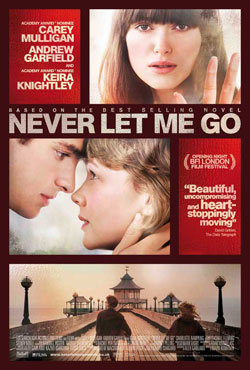LFF: Never Let Me Go – 3*
 Alex Garland’s adaptation of Kazuo Ishiguro’s 2005 novel, Never Let Me Go, is what film festivals and awards ceremonies were made for. Even though the film of the same name gracefully opened the 2010 BFI London Film Festival in October, delivering an example of understated, ethereal British elegance in its style and cinematography, it has been somewhat oddly overlooked at the major film awards of recent months. Could it be that the subtle sci-fi aspect doesn’t fully capture the imagination, or that Garland’s screenplay is too ‘safe’ in its unquestioning nature of some of the rather disturbing elements of his friend Ishiguro’s book?
Alex Garland’s adaptation of Kazuo Ishiguro’s 2005 novel, Never Let Me Go, is what film festivals and awards ceremonies were made for. Even though the film of the same name gracefully opened the 2010 BFI London Film Festival in October, delivering an example of understated, ethereal British elegance in its style and cinematography, it has been somewhat oddly overlooked at the major film awards of recent months. Could it be that the subtle sci-fi aspect doesn’t fully capture the imagination, or that Garland’s screenplay is too ‘safe’ in its unquestioning nature of some of the rather disturbing elements of his friend Ishiguro’s book?
That said Garland has been restraint in capturing the delicate nuances of the novel, keeping the sinister mystery of the three main protagonists’ fate sealed as far as possible, to allow us to feel hope until the very end that one of them will escape their ultimate destiny, especially as we are ‘guided’ by Kathy’s (Carey Mulligan) reassuring narration. Coupled with Mark Romanek’s patient direction, each scene seems to reveal something painstakingly profound, like watching a child or a visiting alien discover new things along its path to enlightenment, so you are always waiting for the penny to drop.
Wise Kathy, overly curious Ruth (Keira Knightley) and shy Tommy (Andrew Garfield) are three pupils of the prestigious Hailsham School for ‘special’ children. Hailsham initially feels quintessentially like a 1950s boarding establishment with strict health rules and tagged but privileged ‘inmates’. However, it soon becomes apparent that this is an alternative contemporary England, where certain humans are expendable, after a shocking truth is relieved to a class of 11 year-olds. But what the immediate authorities have in store for the youngsters on maturity – which is akin to state-licenced homicide, and we are not given any more insight into how the rest of the population feels about the medical atrocities happening in their name, doesn’t seem to particularly faze the chosen youth one bit. This is where this sci-fi drama that is being peddled more as a love triangle story differs from anything else seen on screen in the latter category, and could be conceived as slightly frustrating to those not in the know of the quietly provocative novel.
Even though the three friends discover the truth, are given some form of freedom in a ‘half-way’ house to come and go as they please, and don’t appear to have any authority watching over them, it’s a powerful tale of propaganda and conditioning that sees them blindly walking towards their inevitable demise that has any sane person asking; why? It is this question that drives you slightly mad, even though the characters’ naivety is so endearing that to scold them would be like scolding a small child, plus there is a sweetly amusing scene when they venture into their first cafe. Perhaps we are fooled by Ruth’s sporadic bursts of passion for life and newfound frustrations to do with matters of the heart that we are kept perplexed by what they all truly want? We certainly want to see them get what they really deserve: freedom of choice. But ironically, this is what they have, so why do they not do as the rest of us would in the situation, and escape for a chance of happiness? It’s a fascinating and torturous debate.
There are simplistic ‘red herrings’, including the fact that showing a flare for art demonstrates a soul worth saving – a deeper explanation of which is glossed over in the film, and that only love can save them in the end. Cruelly, this is merely a carrot with which to lead us into believing something can be saved from this morose tale that is crushingly tragic and pointless, apart from showcasing some remarkable performances, including Knightley as a dying woman and Garfield as a tormented man-child. Taken from a sci-fi perspective, it goes against the grain, in that anything to do with science is questioned, and anything corrupt is challenged and defeated. Therefore, thinking of it as a love tragedy of Shakespearean proportions seems easier on the mind, but still leaves obvious queries unanswered.
As with the novel the film-makers offer no final reprieve for cast and audience alike, suggesting death will become us all as we drifted towards our time and date. Never Let Me Go is churlish and unforgiving in love and life, and one of the most discreetly disturbing films you will see as both actors and their characters are left to face their expiration without any contention.
3/5 stars
By @FilmGazer